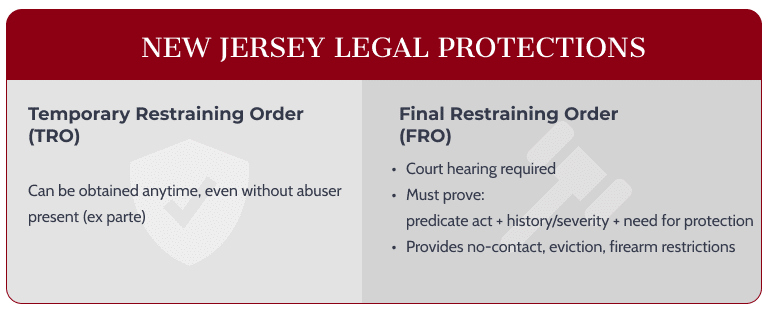NJ Lieutenant Kills Ex-Girlfriend: Understanding Restraining Orders and Domestic Violence Laws
NJ Police Lieutenant Case Reveals Gaps in Domestic Violence Legal Protections
I t was at 5:25 PM on Friday that Santos followed Semanchik back from Long Valley Animal Hospital, a sinister deepening of domestic violence. The case ended in a murder-suicide, with the two victims subsequently found shot inside Semanchik’s home on Upper Kingtown Road. Family members explained that Semanchik had been shot in the back while attempting to flee. Santos was discovered dead in a white Mercedes sport utility vehicle in Johnson Park, Piscataway, from a self-inflicted gunshot wound. Neighbors who had made 911 calls Friday evening after they heard the sound of gunshots and screams were unable to locate the source at first. The corpses were then discovered on Saturday at 12:20 PM by Semanchik’s father.
t was at 5:25 PM on Friday that Santos followed Semanchik back from Long Valley Animal Hospital, a sinister deepening of domestic violence. The case ended in a murder-suicide, with the two victims subsequently found shot inside Semanchik’s home on Upper Kingtown Road. Family members explained that Semanchik had been shot in the back while attempting to flee. Santos was discovered dead in a white Mercedes sport utility vehicle in Johnson Park, Piscataway, from a self-inflicted gunshot wound. Neighbors who had made 911 calls Friday evening after they heard the sound of gunshots and screams were unable to locate the source at first. The corpses were then discovered on Saturday at 12:20 PM by Semanchik’s father.
New Jersey’s domestic violence protection system enables victims to obtain immediate protection through temporary restraining orders, which can be obtained at any time of day or night. These orders can subsequently be turned into final restraining orders after a court hearing, providing more long-term protections such as no-contact provisions, eviction of the abuser from the home, and prohibition against possession of firearms.
Our practice is committed to representing our clients with empathy and precision. We assist clients with filing restraining orders. We represent them at hearings and help enforce court-ordered protections. Beyond immediate protection, we provide ongoing support through the legal process, bringing victims closer to long-term safety.
Legal Definitions and Protections in New Jersey Domestic Violence Cases
New Jersey’s domestic violence statutes are in the Prevention of Domestic Violence Act, N.J.S.A. 2C:25-17 et seq. The statute defines domestic violence as particular criminal offenses committed against a spouse, former spouse, household member, co-parent, or individual with whom the victim has a dating relationship. Predicate crimes are assault, harassment, stalking, terroristic threats, criminal mischief, sexual assault, and other enumerated offenses where the victim presents a threat of harm.
If an individual is in immediate need of protection, the judge can award a Temporary restraining order (TRO). TROs may be granted ex parte, or without the abuser’s appearance, if the judge feels there is an urgent need for protection in order to prevent the victim from coming to harm. These orders are only temporary until a hearing is held.
At the hearing, the court makes a determination of whether to issue a final restraining order (FRO). To qualify for an FRO, the victim must prove that there has been a predicate act of domestic violence, that there has been a history of abuse or that the incident is severe enough. They must prove that protection is necessary to prevent imminent danger. It is up to the victim to demonstrate these facts by a preponderance of the evidence. The person restrained is present at this hearing. They are not only allowed to testify, but they can also bring witnesses.
The requirement of establishing prior history or the need for protection guarantees that restraining orders are intelligently formulated to the needs of each case. This reconciles victims’ and perpetrators’ rights. It also protects victims from genuine threats of continued abuse.

Denied Restraining Order? Legal Remedies and Appeal Options in NJ
When police fail to appropriately respond to domestic violence incidents, civil liability issues arise. Victims may pursue New Jersey tort law claims if police negligence or recklessness contributed to ongoing harm. Cases are typically complicated by the immunities afforded to government agencies, but are still viable if officers were consciously indifferent to an apparent and immediate danger.
If the application for a restraining order is denied, the victim can appeal such denial to the Superior Court, Appellate Division. The appeal process assesses whether the trial court was correct in law and whether the evidence presented warranted such a decision. While the appeal is pending, victims can also try alternative safety measures, such as filing new complaints when later incidents do happen, applying for protection orders in collateral family or criminal proceedings, or working together with advocacy organizations that provide emergency shelter and safety planning.
In some instances, victims are able to bring federal causes of action under 42 U.S.C. § 1983, which allows for suits based on violations of constitutional rights. There may be a cause of action when police brutality or inaction is a deprivation of equal protection or due process. These causes of action have stringent legal requirements but are available in those cases where the local level is inadequate to constitutional requirements.
Victim advocacy is instrumental in overcoming institutional barriers. Legal representation can help to ensure restraining orders are properly pursued. It can review the thoroughness of police reports and highlight any system failures. By connecting legal remedies with advocacy support, victims are more likely to achieve protection and hold institutions accountable where protections are not forthcoming.
New Jersey Laws Addressing Police Officer Domestic Violence
Domestic violence cases involving police officers are strange and sickening problems. The power imbalance is especially conspicuous when the perpetrator is a trained law enforcement officer with access to weapons and possibly close contacts in the department. Victims in these cases are often discouraged from reporting violence by fear of reprisal or not being believed. As it is, internal silences within the cultures of certain departments can impede or block accountability, denying survivors the protection they need and deserve.
The three-way intersection of professional standards, criminal accountability, and victim safety is contentious. On the one hand, officers are bound by codes of conduct and department policies that are required to guarantee fitness for duty and public safety. On the other hand, where the misconduct is criminal, district attorneys must decide whether to indict a police officer. The safety of the victim must be addressed immediately through avenues like restraining orders, removal of guns, and emergency housing. Balancing these three tiers becomes problematic, especially when institutions care more about their reputation than survivor protection.
It becomes particularly challenging for victims in cases where the abuser is in law enforcement. Officers know how investigations work and can use system loopholes to avoid responsibility. Their testimony generally carries much weight with investigators and courts, and it can quell the victim’s testimony. They can remain able to access weapons or use the threat of authority to bully and silence. Enforcing restraining orders in such instances can be dangerous, as it relies partially on the same institutions over which the accused has some control.
New Jersey has mandatory reporting requirements for police departments when a police officer is charged with domestic violence, and the internal affairs units are tasked with investigating such cases. These probes typically involve gathering statements, evidence review, and determining or not the officer should be removed from service. Dispositions may range from counseling or suspension to termination and criminal referral. Recent state policy has increased public reporting of discipline for misconduct, like domestic violence, in an effort to be more transparent. In spite of this, assault victims are confronted with institutional barriers, whereby in-house investigations will fail or amount to minimal discipline.
24/7 New Jersey Domestic Violence Legal Help Available

We provide seamless assistance to anyone requiring a restraining order or protection against abuse. From initial filing through courtroom appearances and ultimate order enforcement, our attorneys are involved step-by-step. We detail each process, aid in evidence gathering, and advocate aggressively in hearings to secure long-term safeguards such as no-contact orders, removal of the abuser from the home, and gun restrictions. Along with short-term protection, we refer clients to seek out resources for long-term safety and stability. Our clients can call us at any time to report sudden issues or impending danger. Additionally, we offer a complimentary initial case consultation for restraining order cases, allowing individuals to explore their options before making crucial decisions. This access provides timely guidance to protect our client’s rights immediately.
The Tormey Law Firm Protects Your Rights in All Restraining Order Matters
Our restraining order services are particularly designed to protect victims who need immediate and long-term safety from abuse. We work towards securing both temporary and final restraining orders so that clients can have the legal protections necessary to protect themselves. We also have extensive experience representing clients accused of making false or exaggerated domestic violence claims. Such cases require special attention to evidence and a strategic defense to prevent unjust outcomes, particularly when reputations and personal relationships are at stake. For some of our clients, civil restraints can be a substitute for a restraining order. We broker these agreements when needed, enabling both parties to reach an agreement that limits disputes without sacrificing valued interests. Our services extend to appeals and motions to vacate or modify restraining orders. In cases where a victim has been refused protection or an accused is seeking relief from an abusive order, we pursue post-hearing relief to rectify errors and provide equitable outcomes. With a long history of practice in the Superior Court Family Division, we offer expert understanding of family court procedure in every case. This expertise allows us to advise with certainty, whether requesting protection or responding to charges in a sensitive and high-stakes setting.
Need immediate help with a domestic violence legal matter? Call us 24/7 at (908) 336-5008 or contact us online for your free consultation. Time is critical in domestic violence cases – don’t wait to protect your rights.



